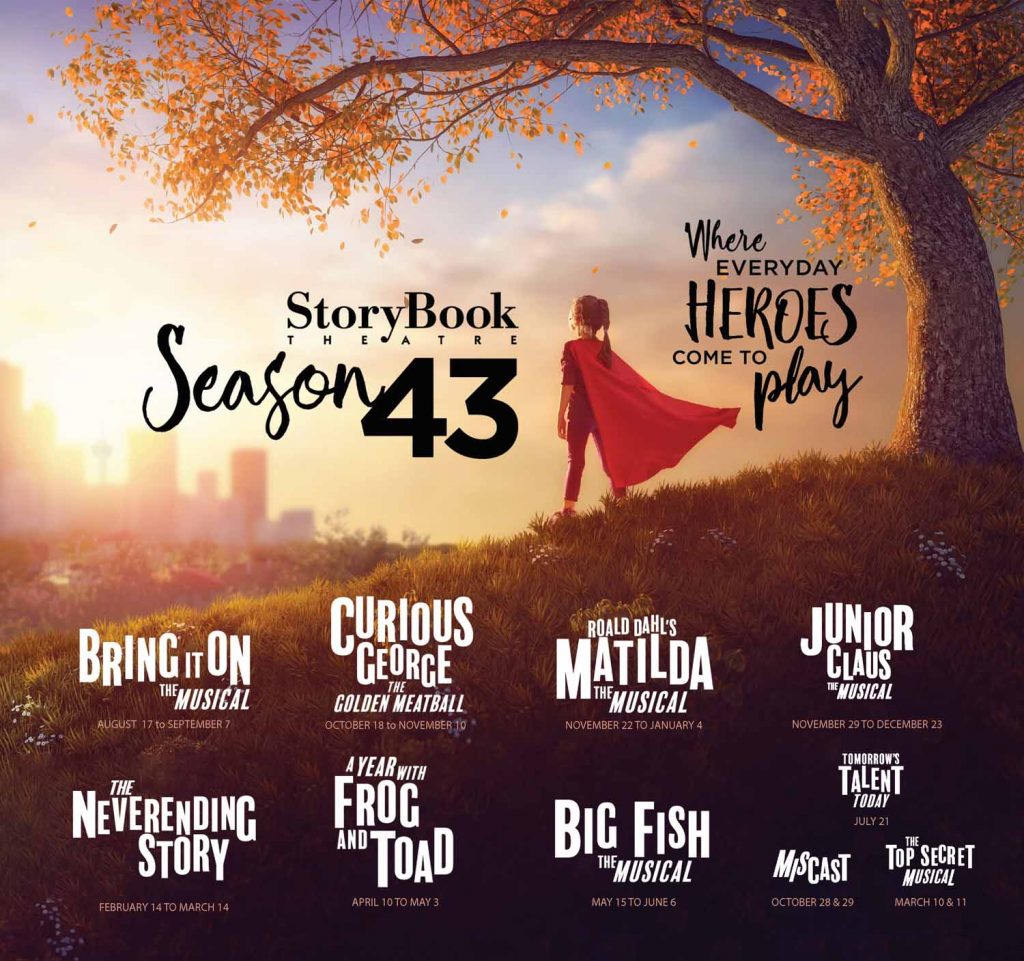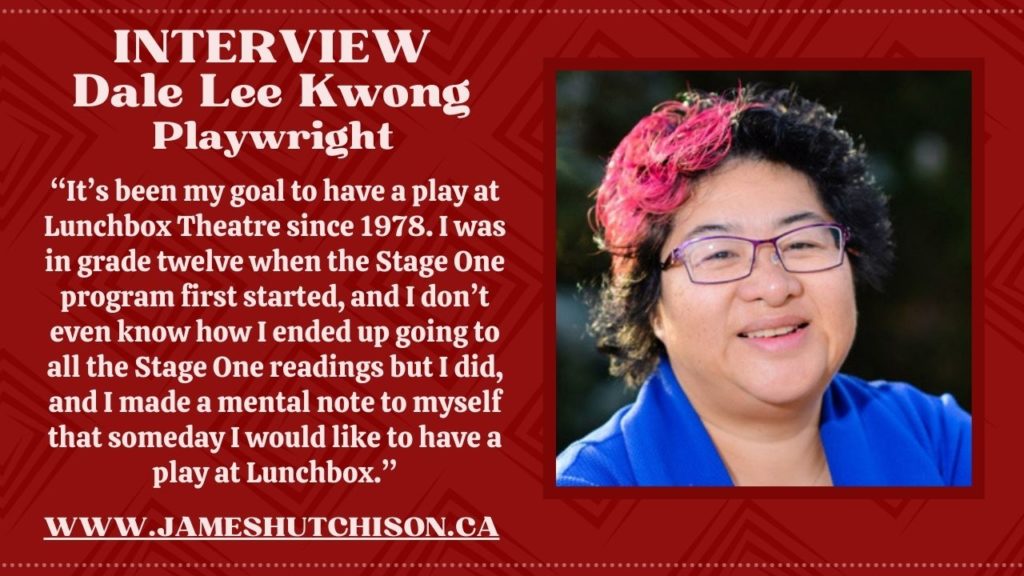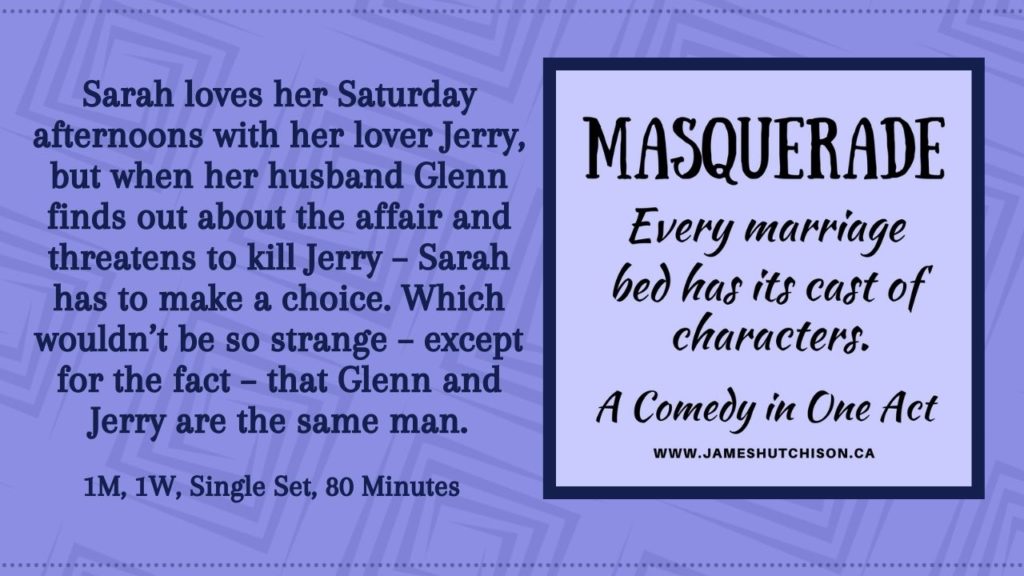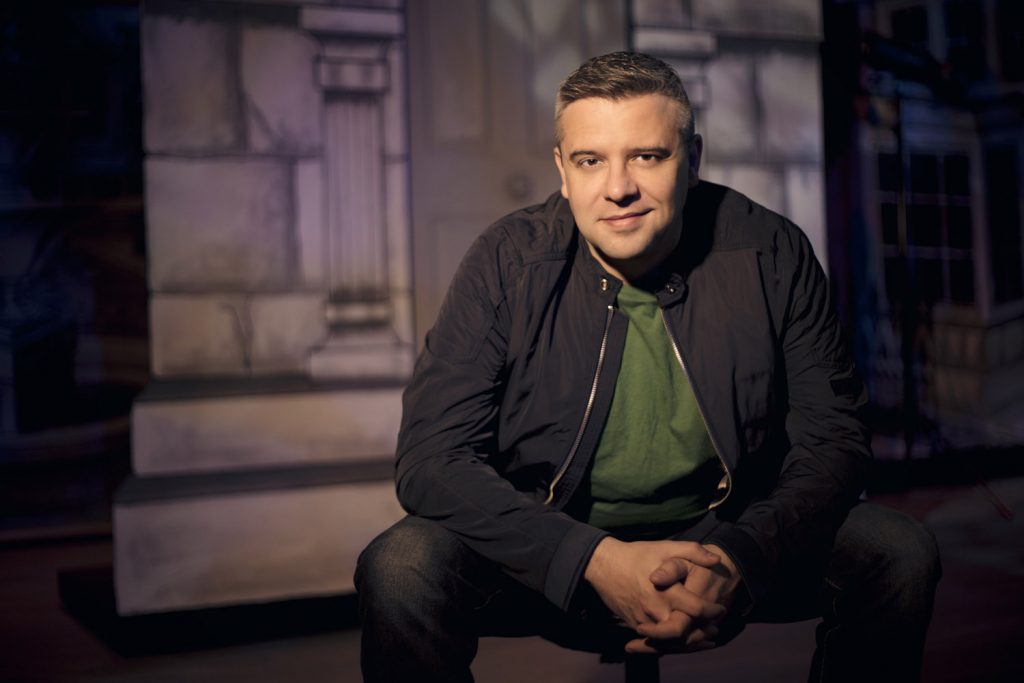
StoryBook Theatre is Canada’s largest volunteer-run Theatre for Young Audiences and produces a season of plays that are designed to offer mentoring opportunities and artistic development to emerging artists while providing high-quality entertainment at affordable prices for Calgary families and theatregoers. In addition to offering a season of plays, StoryBook also runs a year-round theatre school that provides classes in acting, dance, and music for children, teens, and adults. Now in its 43rd Season and operating out of the Beddington Theatre Arts Centre StoryBook has entertained more than a million Calgarians and has become an important part of the cultural fabric of this city and an integral link between the professional theatre community and emerging artists.
Part of the driving force behind StoryBook Theatre’s success and growth has been its Artistic Director JP Thibodeau who is an award-winning actor, director, and theatre designer. Over the last few years JP has worked with playwright and composer Joe Slabe to create world premiere musicals, including Lest We Forget, Naughty But Nice, and the multi-award- winning Touch Me: songs for a disconnected age, presented by Theatre Calgary. He has worked on stage and behind the scenes on a variety of productions including Richard III and Romeo & Juliet with The Shakespeare Company; Rock of Ages and The 39 Steps with Stage West; Dad’s in Bondage and Lest We Forget with Lunchbox Theatre: and A New Brain and Avenue Q with StoryBook Theatre. JP has directed more than 55 musical productions and has worked tirelessly to foster the growth and development of young musical theatre artists across the country. He is the recipient of the 2016 Greg Bond Memorial Award for outstanding contribution to musical theatre in Calgary and was just awarded the Sandstone City Builder Award at the Mayor’s Lunch for Arts Champions in recognition of his work with StoryBook theatre and emerging talent.
I met with JP at his office in the Beddington Theatre Arts Centre at the end of July just before he was about to begin directing the North American tour of Queen’s We Will Rock You by Ben Elton for Annerin Productions and Jeff Perry Promotions to talk with him about his own journey and his vision for StoryBook.

JAMES HUTCHISON
You got a nice honour at the Mayor’s Lunch for Arts Champions this year. You received the Sandstone City Builder Award.
JP THIBODEAU
The award is really about the initiatives we’ve been doing here at StoryBook. And I didn’t really realize it but my entire career has been about emerging artists and community building. I think the hard part about getting the award is that I get the honour of the award, but there really is a team of people that contribute in a lot of different ways.
JAMES
So, you came into StoryBook with a vision that you’re now seeing realized. Can you can talk about that initial idea and vision?
JP
I left a previous job after ten years because I got to a point where I wasn’t fulfilled artistically or business-wise. So, I had to walk away from that for my own sanity, and at that point I didn’t know what I wanted to be when I grew up.
And George Smith, who was running StoryBook at the time, had reached out to me and said, “Can you direct a show for us?” And so, I came out and directed a show and we had lots of talks about StoryBook and where it was because the year previous it had almost gone bankrupt. So, they were trying to figure out what it needed to be when it grew up.
So, we were both in this – what do we want to be when we grow up stage?
And when 2013 came around, they asked me to take over interim, but I knew I didn’t want to take a job just because I needed a paycheck. I needed to make sure that there was some fulfillment in it. So, the board and I talked a lot about vision. And we had a retreat and I said, “What’s missing in this community is a bridge between the professional theatre community and the amateur world.”
And there’s nothing wrong with the amateur world. There’s an important place in the world for community theatre. But what’s missing is that in between for the people who’ve gone away to school and they’ve come back to Calgary, but they can’t get hired at Theatre Calgary or anywhere professionally yet. And there’s no one helping them hone their musical theatre craft and saying you have potential – so let’s change that and put them with some professionals.
And one of the biggest realizations I had my first year when I took over was understanding the importance of networking in the arts and how fundamental that is to any career longevity. You need to know people. You’re not going to get an audition – you’re not going to get an interview – you’re not going to get anything with anybody unless they’ve heard of you, or someone in their circle has heard of you. And so that really became my focus as an emerging artist myself.
JAMES
What were some of the pillars that you wanted to put in place to make your vision of StoryBook a reality?
JP
My kids had a big part of that because at that time we were going to the Saddledome to see The Wiggles, or we were going to see these big touring shows that we’re paying 80 and $90 to go see. And there’s nothing in it for the parent. It’s just for the kids. So, as parents, you’re just chaperones, you’re just babysitters and I’d think, “This isn’t family time because I’m not getting anything out of it.”
And StoryBook used to have this thing called Cookie Cabarets, and the audience would come in and all the kids would file down to the front of the building, and the parents would sit at the back, and I would go to the booth and watch the show from the back, and I’d see all the parents on their phones while all their kids are down front, and they weren’t sharing the experience because we were telling them the kids sit close and the parents sit at the back. We were telling them don’t enjoy this as a family.
Within the first month after seeing that I changed it and said, “We aren’t doing it anymore.” And I got lots of backlash. And I said, “No, they need to enjoy this together.” So, then it became if they’re going to enjoy it together, there’s got to be something in it for the adults. So how do we do that? And that’s when the re-planning and the reshaping of what our seasons would look like began.
JP
And for me, it became about engaging professionals. Every show needed to have professional mentorship. Whether that was the director or the choreographer, or the stage manager, whoever it was, there needed to be that professional development and mentorship on the team. And in those early years, and even today, I really make sure that everyone on the team is offering some kind of a mentorship to those emerging artists who are finishing high school or have just come back from university or college. And by giving them that mentorship we instantly elevate the quality of the show.
And that’s when directors like Mark Bellamy or Karen Johnson Diamond or Kevin McKendrick and all these other great Calgary artists got involved and started really helping me shape who we were going to be. And so, we started elevating the production quality and that gave the parents something. So now they’re going, “For my $25 I’m getting so much more, and it’s worth the time with my kids.” And I think the beauty of theatre, in general, but especially in our city with a lot of oil and gas families where mom or dad work a lot is that they get to spend that time in the theatre with their kids and this is their hour they’ve set aside to come and be with the family.
JAMES
One of the things I really like is that you have the cast come out for autographs and selfies at the end of the show.
JP
That was the one thing I was told I would not be allowed to change, but when I first took over I didn’t want to do it.
JAMES
Really?
JP
As an actor, I don’t like being me. I like being a character on stage. But after watching the first season I thought I don’t know how you couldn’t do it. We get letters from the kids and from the parents who took their child to their first show ever where they got to see the show and then meet the people in the show after.
And when we do our first meet and greet for a new show that’s starting production we talk about the importance of what we do and why we do it. We talk about StoryBook and who we are and where we’ve been, and why I’ve assembled the team I’ve assembled for that show.
And we talk about how they’re going to be someone’s first theatre experience and someone in that audience is going to be moved enough to pursue this as an art form or become a future patron all because of what we do in this show. And nine times out of ten that someone comes and talks to you after the show and you may not even realize it until I get the email later and forward it to you.
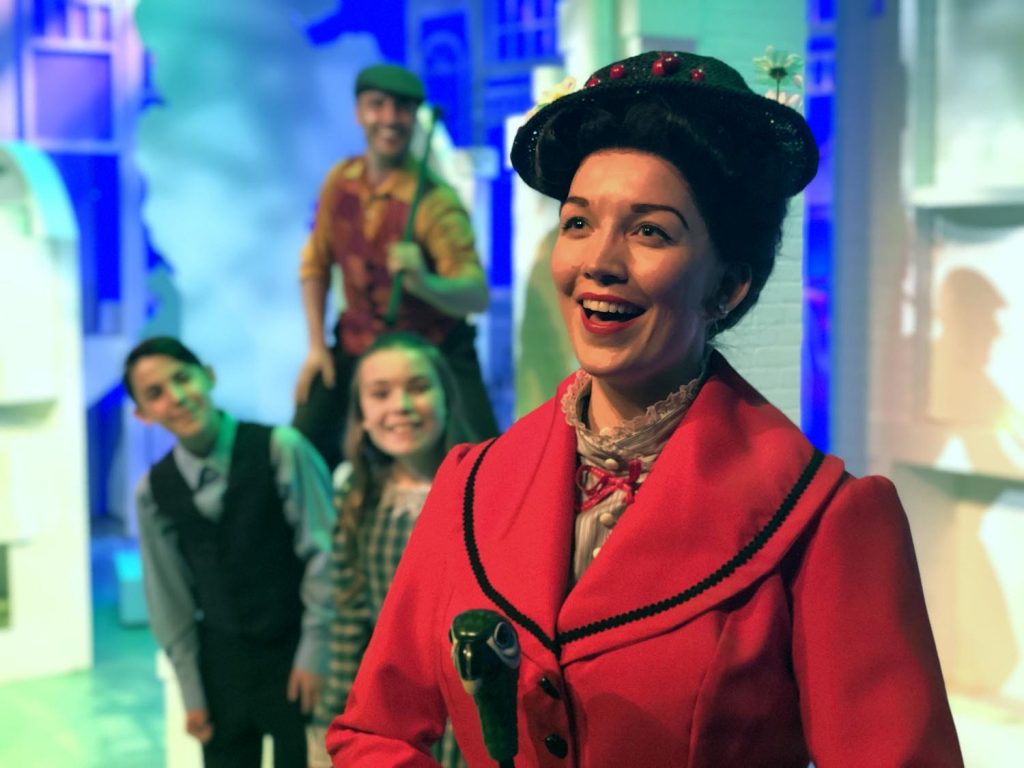
JAMES
Where do you want StoryBook to be two, three, four years from now?
JP
Right now the office runs with two – three people – max and at this point we want to look at the internal and figure out how do we support me? How do we support the office? How do we support the Theatre School in a way that has longevity and sustainability, because while we were growing all the programming, we never grew the office. So, we never gave focus to the bloodline that makes this all actually happen.
The board and I had a great talk last year and I said, “You know, when I first took over, I said in ten years, we should be equity, and be a full union house.” And last year, I said to them, “I’m going to retract that. I don’t know that we should because I still think we’re a necessary part of the building blocks of the community. We are the next step for someone who’s looking to make a career. But we’re not the full step. And so, we need to focus on the educational component, and really make sure that what we’re offering is mentorship and guidance into the next level of someone’s career.”
And we do that right now through the shows but I’d love to see that transcend a little bit more into education. And you know, by no means am I suggesting that in five years StoryBook will become a college or anything like that and it’s not necessarily the Rosebud model either but something where a student could finish school and we offer internships where they’re directly correlated to a school program where they can come here and work on set design, for example, and create these relationships beyond the StoryBook doors. But right now, we don’t have the capacity to do that administratively, so I want to figure out how to grow us from the inside.
JAMES
So, what you’re looking for is the business model that will allow for people to come here and work and mentor and build an organization that has stability.
JP
That’s exactly what we’re looking at is the business model and I think this current season has the right number of shows for us, and I think beyond this it would probably be doing tours. We could take some of the shows we’ve created, or some of the shows that we’re working on, and start touring them. Like Alberta tours, or Western Canada tours, or across Canada tours.
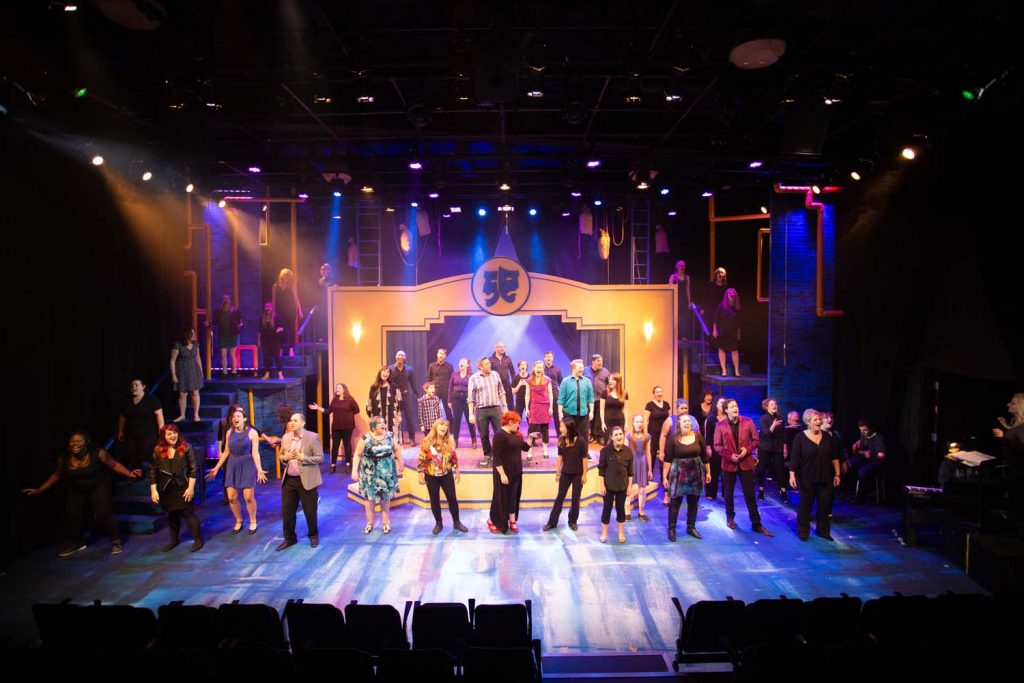
JAMES
StoryBook offers subsidized programming can you tell me about that?
JP
When I first took over, we had a theatre school and at that point we were seeing about 500 kids a year. Now we see about 3000. And so it’s grown a lot. But one of the biggest comments we would get on feedback forms was parents saying they wish they could do more but they can’t afford it. And so, we started talking in the office, and I said to the team, “Well, what’s one more kid? It doesn’t cost us anything more to throw one more kid in the classroom.” And I said, “Let’s just try it.”
And so it quickly became our mantra to not say no to anybody. So, on average we get five or six requests for subsidy a week. And I remember I was talking to this one girl’s dad and he said they feel like they’ve done their daughter a disservice because they couldn’t afford piano or dance or voice lessons for her because this is her love, but they just have no money to do it. And they were so so happy that she can at least audition for the shows and get in and that made me realize how fortunate I was as a kid. I was fortunate enough to have voice lessons and piano lessons because my parents could afford it.
But there are so many kids who can’t. So, we decided that we’d create this program, The Ellie Tims Project named after one of the founders of StoryBook. And the intention is to give youth whose families can’t afford it free piano or dance or voice lessons for a semester and provide free building blocks and inspire them. That’s part of the reason we want to look at the business model and figure out how to get more fundraising to support these programs.
JAMES
So, what you initially started in order to create a bridge between the professional world and the community theatre world has turned into city-building and community-building.
JP
It is now, for sure.
JAMES
I bet you didn’t anticipate that.
JP
I didn’t. Not at all. I never saw myself as an emerging artists advocate. But when I ran this dinner theatre in Canmore, you know, having been freshly out of school, I was hungry for a job. So, I knew where the hungry people were, right, the ones who were just finishing school. They’re keen, they’re eager, they’re willing to try and do things and they have a more naive, yet energetic attitude, and there’s more optimism to them wanting to be a part of something.
So I did that – then, and I’m still doing it now. And at StoryBook our Student Summer Intensive Program is the nearest and dearest to me. It’s all these young people who have just found themselves. They’ve just decided who they are, and how to express themselves and you watch them form these relationships that will last a lifetime. They don’t know it yet, but we know it – watching it.
And so, you watch them bond and I always say to the parents on opening night that this program isn’t about them putting on a show. It’s about them finding themselves and creating something together and being community builders. And usually, at the end of the program, I’ll ask who’s planning to make this a career and less than half raise their hands.
There was one girl a couple of years ago who went through the program and now she’s in her fourth year of University because she’s always wanted to be a lawyer, but she took the program because she just loves it. That made me realize that this is about building and understanding community. And theatre is about community and how we interact with each other. Good or bad. We work together. We work through it.

JAMES
One of the things I want to talk about, other than the StoryBook is your own work because you’re a designer, you’re an actor, you’re a singer. You’ve done all these other things. I’m just curious about some aspects of you as an artist. What about as a director? How do you approach a show?
JP
The script has to be one that I’m excited about and passionate about and I think a lot of it comes down to casting. And I think for me as a director I’m okay with young people who don’t have it already there. I think for a lot of directors the casting is 90% of the work, because if you cast the right people the show is done. But I like casting the diamonds in the rough. The talent is there, but it might not be polished, and I like that, as a director, I like that challenge and seeing them grow in the process.
JAMES
And perhaps an artist at that stage is going to grow a great deal more given that opportunity.
JP
I think so. A lot of my process is about living on your growing edge and so I talk about that a lot in the rehearsal process. If the scenes are too comfortable, you’re not growing. And so, we talk a lot about that and a lot about storytelling and that musicals aren’t about music they’re about storytelling and using the music to help tell that story. So, if that means that the song isn’t as perfect and beautiful as it could be that’s okay as long as you’re telling the story because the audience can feel the story and hear the story and that’s fundamentally your job.
JAMES
Any particular show on your wish list that you want to direct?
JP
There’s two. One is A Chorus Line. I don’t know why. Maybe it’s because I’m not a dancer, and I’m not a choreographer. But I’ve always had this great vision for this show, and I would just love to see it come to fruition. The first time I saw it I don’t think the director understood the show. It was a tour. I saw it in Toronto. All the acting was disconnected from the song. And I felt like there was acting going on and then songs going on and there was no connection. And for me, as a director, in my rehearsals I’ll talk a lot about how dialogue is the extension of music.
So when a song is up tempo the dialogue immediately following that song should still be in that tempo. And the dialogue in that scene should take us to whatever the tempo is for the next song. We should feel that naturally. It shouldn’t feel jarring when all of a sudden the song stops and now we’re talking to this person in the scene.
I think the way A Chorus Line is set up is it is very much – dialogue by this person, they sing a song, next person, and so on, right. Given that the title of the show is Chorus Line it’s about the group of people not the individuals, and I think, every time I’ve seen it, that’s been a part that I feel is lost – the idea that this is about that group, the whole group of people and their connection to each other, not just one person, which is the irony of the show.
JAMES
So, that’s one.
JP
Yeah, that’s one. And I want to direct Shakespeare but I don’t know it well enough. And I’ve done my fair share of contemporary Shakespeare designs but I just don’t feel Shakespeare’s as accessible for a modern audience as it could be. I think the Shakespeare Company’s done a great job of bringing that together but I would like to direct it and make it more accessible to a modern audience and someone more like me.
JAMES
That would mean commissioning and reworking the script obviously.
JP
Totally.
JAMES
The Lion King did a pretty good job of reimagining Hamlet.
JP
I think my bucket list would be to do something like that. Something that’s innovative. I’d love to create something new and be a part of the creation of it and a part of a team of creators.
JAMES
What are you working on right now?
JP
I’m working on Queen’s We Will Rock You by Ben Elton for a North American tour.
JAMES
How did that opportunity come about?
JP
I think this is one of those networking opportunities where you’re just connecting with all the right people at different times and then somehow, they all connect and come together at the same time.
This is through Annerin Productions here in Calgary and Jeff Perry Promotions. Jeff has been one of the biggest stadium promoters in Canada for years and they wanted to start creating shows. And they’ve done this with RAIN and Let It Be that went on to Broadway and the West End. And they recently did that with Jukebox Hero and when they were developing that show they asked me for advice and input about how they could do it in Calgary.
And with We Will Rock You I think there are ten Alberta based artists performing in the show out of a cast of sixteen and the whole band is from Calgary. The entire production company is all Calgary based and so it’s pretty impressive for a North American tour coming out of Calgary to be happening.
JAMES
I’m seeing A Chorus Line down the road.
JP
There you go.
JAMES
So, here’s a logistical question. You’re designing a show that you’re going to pick up, and you’re going to set up that morning, you have a quick tech and that evening you have a show, and then you strike and go to the next town. What are some of the logistics of creating a touring show like that?
JP
My brain has been hurting? Just so many questions. Every stage is a different size. So, how do I block the show? Do I block it for the smallest stage? Do I block it for the medium stage? So we’re making decisions as we go and seeing what works best. And there’s been a lot of that kind of stuff. Plus, Queen’s pretty heavily involved. Which is so cool and so scary all at the same time. So, their music Supervisor flies in on Monday to be with us for the first week of rehearsals to make sure all of the music is learned the way that Queen wants it learned.
JAMES
So, you have to lock things in earlier. Things that you wouldn’t normally have to lock in at that point.
JP
Yeah. The show’s been designed to travel and transport and build in four hours and so it’s got to easily pack up and the set has to be built before we even start rehearsals. I have to commit to everything whereas with StoryBook there’s a little more flexibility.
JAMES
When does it open?
JP
It opens September 3rd in Winnipeg and then travels to ninety-plus cities in the US and Canda through to March 2020. Including New York City at Madison Square Gardens in November and then it comes back to Calgary December 27 at the Jubilee.
JAMES
I have one other question. So how do you manage your time? Like with your commitment at StoryBook and your directing how do you keep organized? How do you keep things on schedule? Because you’re such a busy guy.
JP
Well first, I hate the word busy. I call it living. It’s a choice and no one’s forcing me to do it. So, it’s not busy and I know my wife on certain days will disagree, but I think we’ve gotten a custom in our society to glorifying busy or the idea of busy. You know someone might say to me, “I’m so busy at work today.” And I’ll go, “What’s so busy?” And they’ll say, “Well all these patients today.” And I’ll say, “Oh, so like you went to work. You did your job.” So busy now is just working. That’s why I hate it
JAMES
Alright, I’ll change the question, then. How are you so productive?
JP
I don’t think I would be if I wasn’t organized. And there are times of the year where it’s great and there are times when it’s a gong show. Christmas time is a gong show every year until December 12th hits, and it’s my birthday, and all the shows that I’m part of are open. It’s fortunate that in the position I’m in now and where I am at in my life that I can be a little bit more prescriptive about when I work, or when I’m on-site to work. Because I can do a lot of it from other places. And we’ve done pretty good as a family setting aside time. I’ve got two boys. So, even driving here today, I was dropping my boys off at swimming and I would reach over and poke my son and do these things that annoyed the hell out of me as a kid when my dad would do it. And I’m doing it now because I just want to be connected to him. But it’s tricky, because, my job is night and my wife’s job is day and so we’re passing ships in the night sometimes.
JAMES
You have a very clean desk for a person who is so productive.
JP
It’s funny, you’re the third person this year, who has said that to me. Someone came into my office and said, “Well, who’s desk are you sitting at?” I said, “Mine.” He said, “That is your desk? I figured your desk would be the messiest desk.” And everyone in the office was laughing because that’s exactly, I think, how people see me. They see everything I’ve got my fingers in, and they think I must live in chaos. And I don’t. I can’t be artistic and thrive unless I’m organized, at least I know that works for me.
